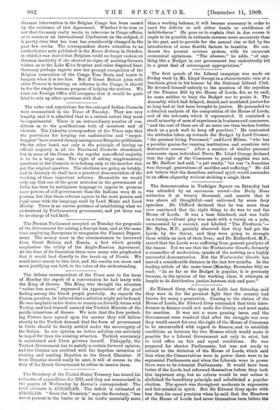The rules and regulations for the enlarged Indian Councils were
summarised in the Times of Tuesday. They are very
lengthy, and it is admitted that to a certain extent they must be experimental. There is an extraordinary number of con- ditions as to the qualifications both of members and of
electors. The Calcutta correspondent of the Times says that the provisions for keeping out undesirables and " carpet- baggers" have created dismay among some Bengalee pbliticians. On the other hand, not only is the principle of having an official majority in all the Provincial Councils abandoned, but in some of the Councils the regular non-official majority is to be a large one. The right of asking supplementary questions in the Councils is to belong only to the member who put the original question. The elections are going on briskly, and in January we shall have a practical demonstration of the working of these important reforms. Meanwhile we would only say that one of the great mistakes in the government of India has been by ambiguous language to appear to promise more powers of self-government than the Indians were fit to possess, but that these reforms square in the most precise and legal sense with the language used by Lord Minto and Lord Morley. There is no unwise pretence of establishing what we understand by Parliamentary government, and yet there can be no charge of bad faith.
























































 Previous page
Previous page